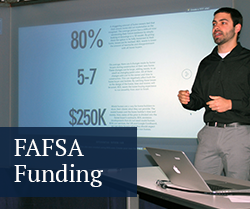
GAANN Fellowships
Integrated Delivery of Ultra-High-Performance Buildings
The Penn State Department of Architectural Engineering is leading an initiative, sponsored by the U.S. Department of Education, to help transform the way our buildings are designed, built, and maintained through doctoral education and knowledge creation in the integrated delivery of ultra-high-performance buildings. To support this goal, we are recruiting 8 to 10 highly qualified Ph.D. candidates for GAANN Fellowships. Fellows will:
- Enhance teaching, research, and professional practice through the pursuit of their Ph.D. under the supervision of one of the faculty members from the Department of Architectural Engineering
- Participate in the Architectural Engineering Institute's new initiatives related to research and dissemination
- Enhance existing partnerships between Penn State and the U.S. Department of Energy national laboratories (e.g. Lawrence Berkley National Laboratory [LBNL], National Renewable Energy Laboratory [NREL], and the Pacific Northwest National Laboratory [PNNL])
Application Process
All applications to the Penn State Department of Architectural Engineering Graduate Program will be reviewed for consideration for GAANN Fellowships. To apply to our graduate program, please submit your application through the J. Jeffrey and Ann Marie Fox Graduate School. Primary criteria considered in the Department of Architectural Engineering graduate application process include:
- GPA
- GRE scores
- research experience and published products
- awards and honors
- recommendation letters
A faculty adviser will be selected for each student during the evaluation process to ensure the best fit for the student and the research he/she intends to conduct. Additional criteria, beyond the existing Penn State Architectural Engineering Graduate School process and requirements include:
- U.S. citizenship, permanent resident, and
- Must be pursuing a Ph.D.
Financial Support
GAANN Fellows receive financial support including:
- tuition
- medical insurance coverage
- a fellowship stipend.
The stipend for 2019, based upon the National Science Foundation Graduate Fellowship can be awarded up to $34,000 per year; however, the value distributed is assessed based on financial need and local cost of living, through the Financial Aid Office. After students have been admitted to the architectural engineering graduate program and identified as a GAANN Fellow, they will be asked to apply through the Free Application for Federal Student Aid (FAFSA), if they have not already done so.
Course requirements
With the exception of the courses in Table 1, GAANN Fellows will determine their coursework in consultation with the guidance of their dissertation committees. This flexibility will ensure a reasonable time to completion of degree while maintaining the disciplinary context essential to integrated delivery of ultra-high-performance buildings. At Penn State, successful completion of the Ph.D. dissertation requires the student to earn at least 42 non-thesis graduate credits beyond the bachelor’s degree and participate in independent research sufficiently demanding in its technical content. In addition, GAANN Fellows will be expected to satisfy the following specific academic requirements to earn their Ph.D. degrees:
Table 1: GAANN Team Required Courses Offered by GAANN Core Faculty
| Course Title (Number) | Relevance to GAANN Program |
|---|---|
|
Integrated delivery of ultra-high-performance buildings (AE 572, 3 credits) |
AE 572 provides an overview of integrated delivery. The course explores the methods used to implement an integrated process for a capital project. Many vital decisions are made, and critical activities performed early in a project that impact how the project is completed. These include defining the project objectives, identifying constraints, recognizing stakeholders, defining the process and decision-making approach, and selecting financing. |
|
Smart Building Analytics |
This graduate course will explore applied data analysis and statistical methods in intelligent building energy system design and control. Methods that may be introduced throughout this course include regression and linear modeling, classification and clustering, time series analysis, Bayesian parameter estimation, neural networks, and reinforcement learning. Methods will be motivated through a variety of datasets and applications, such as energy performance prediction, fault detection and diagnosis, model calibration, non-intrusive load monitoring, and smart building controls. This course will be delivered by Gregory Pavlak, assistant professor of architectural engineering. |
|
Research Methods in Architectural Engineering |
This course will focus on professional development of GAANN Fellows to prepare them for careers in research and academia. Topics will range from professional practice and presentation skills to building interdisciplinary collaborations and grant writing. This course will be coordinated by Somayeh Asadi, assistant professor of architectural engineering, with contributions from all GAANN faculty. |
Supervised Teaching
GAANN Fellows are expected to pursue excellence in teaching. To support that effort, GAANN Fellows will receive supervised teaching experience through classroom training as well as supervised observations, as outlined in Table 2. Each Fellow will be required to take the College of Engineering’s one-credit introduction for new teaching assistants. Following this six-week course, each student will engage in instructor training and mentoring, based upon the Schreyer’s Institute Graduate Teaching Certificate program, through which each Fellow will (i) complete the Schreyer’s Institute new instructor orientation, (ii) take an instructional course in Teaching and Learning in Higher Education (HIED 806), (iii) take a course in Supervised Experience in College Teaching (SUBJ 602) to observe and assist an instructor in the classroom, and (iv) develop a teaching portfolio.
Table 2: GAANN Teaching Experience and Preparation for an Academic Career
| Step | Main Activity | Supporting Activity | Supervision | Assessment |
|---|---|---|---|---|
|
1 |
New Instructor Orientation
|
Attend teaching seminar | Orientation instructor and doctoral advisers | The Schreyer Institute instructors |
|
2 |
Teaching and Learning in Higher Education*
|
Shadow mentor, attend presentations, workshops | Course professor and doctoral advisers | Course professor and teaching mentor |
|
3 |
Supervised Experienced in College Teaching
|
Shadow mentor, attend presentations, workshops | Doctoral advisers and teaching mentor | Student feedback, feedback self-assessment, and mentor |
|
4 |
Develop Teaching Portfolio | Teaching philosophy workshop | Doctoral advisers and teaching mentor | Electronic portfolio review |
* HIED 806, Alternatively, Fellows may take the Course in College Teaching, through Schreyer’s Institute







